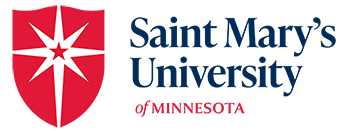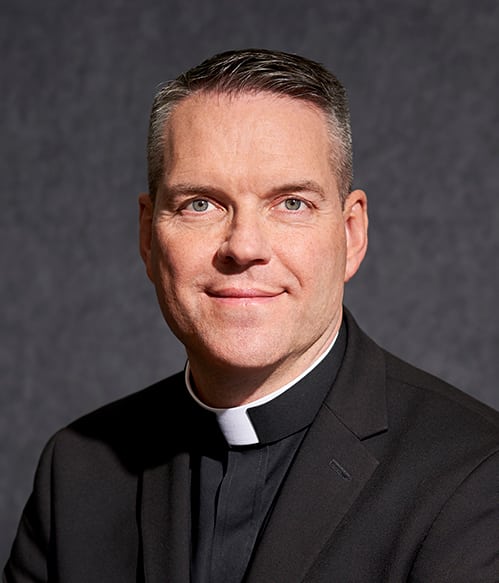Saint Mary's Newsroom
Campus ConnectionAn update from the president to alumni and parents

Giving a voice to transgender clients
One of the first things Jesse Moonen M’16, D’19 (she/her) shares with someone she’s first meeting is her preferred pronouns. To her, it’s important to give people a voice, especially the marginalized.
In her work as a post-doctoral fellow, the marginalized are often transgender clients, which is why she decided to focus her dissertation on the subject.
Moonen is a Saint Mary’s University graduate of both the M.A. in Counseling and Psychology program and the Doctor of Psychology (Psy.D.) in Counseling Psychology program. While working on her doctoral degree, she studied gender extensively.
“It’s an ongoing change, but trans people have always been here,” she said. “It’s not a new phenomenon; people who are gender diverse are just getting the limelight right now.”
Moonen has spent the past year and a half at University of Wisconsin Whitewater, first completing her clinical doctoral internship and then staying on for post-doctoral work. As a post-doctoral fellow, she’s completing supervised clinical work so she can later apply to become a licensed psychologist.
Day-to-day, Moonen works with college-age students. She typically sees students for individual sessions once every two to three weeks and also does outreach work on campus, educating students and faculty about mental health-related issues, stress, health care, and more.
“Students at the university have often been through a lot prior to even coming to college, so there are a number of clients who struggle with suicidal thoughts quite often. That involves a lot of risk assessments and hospitalizations,” explained Moonen. “I’m also seeing a lot of the queer and trans students and working with them on a variety of concerns. It’s rural Wisconsin, so it is a different type of setting with fewer resources.”
When deciding on a topic for her dissertation, she wanted to do research that would be impactful, give people a voice, and help clinicians in the area or who work with this population.
“At the time, clients were coming in with a lot of emotional stuff happening surrounding the election — a ton of fear, a ton of safety concerns, and a lot of trauma responses and increased mental health symptoms occurring around the campaign and the election,” she said.
Given her profession, she was interested in learning more about how these issues affected clients and what clinicians could do to better serve them. She was hearing a lot of clients, both trans and cisgender, talk about the political climate in their sessions and started gathering anecdotal evidence about how it was impacting them.
Her dissertation topic emerged: “Mental Health Providers’ Work with Transgender Clients Surrounding the 2016 Presidential Campaign and Election.”
To lay the groundwork, she summarized what was happening in the 2016 campaign and election, what was happening for the LGBTQ community, what was happening for transgender people, and what was happening locally. All of her research was done in Minnesota. Moonen emphasized that her research focuses on a snapshot in time. It doesn’t include a baseline of before the 2016 campaign and election and was all completed in Dec. 2018 and Jan. 2019.
“Because gender is not something everybody understands, I talked extensively about it in my dissertation, describing what it means and why language is so important,” said Moonen. “Gender is our psychological sense of self. It is about what society says is appropriate for boys and girls, and men and women with regard to roles, appearance, behaviors, and activities. All of these aspects of gender impact how we feel about ourselves, how we behave, and how we are with others. It is different than sex and sexual orientation.”
She was interested to learn that clinicians were having to manage their own feelings surrounding the political landscape, particularly when those feelings contradicted those of their clients. With discussions about politics coming up in sessions, it was even more important for clinicians to navigate conversations through a professional lens, instead of an activist role, and really be present with the client in what was going on for them surrounding the election and campaign.
But what surprised her most was how aware clinicians already were of intersectionality, which she described as “the understanding that different privileges come with different identities and recognizing that all identities are there, are important, and are worth talking about — that includes age, gender, religion, socioeconomic status, and more.” Moonen was encouraged to discover clinicians were recognizing and acknowledging all the different identities that people hold and how the identities work together or can be conflicting.
“This struck me because I didn’t know it was going to be so apparent in their work,” said Moonen. “Seeing how all of those play together and how much of that comes up in this work is pretty incredible.”
As we enter another election season, Moonen is paying close attention to how these themes might play out again.
“I see my clients being proactive on a local and state level right now, but I do anticipate more conversation occurring as the presidential election nears,” said Moonen. “I’m not sure the same reactions will happen, because we’ve been living in this political landscape for four years now, but it will be interesting to see if and how things change for clients and mental health providers throughout this next election and presidential term.”
Moonen presented her research at Saint Mary’s annual Doctoral Research Symposium in March 2019. She was one of the first Psy.D. students to ever present at the symposium as it had historically featured Ed.D. students. This year’s symposium will take place Saturday, March 7.
“After my presentation, someone came up and thanked me for my work because someone in their family just came out as transgender. They were appreciative someone was paying attention to transgender health,” Moonen said. “I was grateful I was able to reach a broader audience that I wouldn’t have normally had access to.”
Moonen doesn’t know if more research is in her future, but wants to continue providing therapy for college students. She said she enjoys working on a college campus and recently developed a website and brochure about transgender health.
She hopes her research will reach other mental, physical, and medical health providers so they, too, can better understand gender and how to better provide gender affirmative care.
“We don’t have to know everything; that’s impossible. But to be affirming to a person who may be struggling is incredibly beneficial,” said Moonen. “I’m hoping that the research will also continue to give a voice to people who don’t often have one.”
Photo caption: Jesse Moonen presents her research at Saint Mary’s annual Doctoral Research Symposium in March 2019.
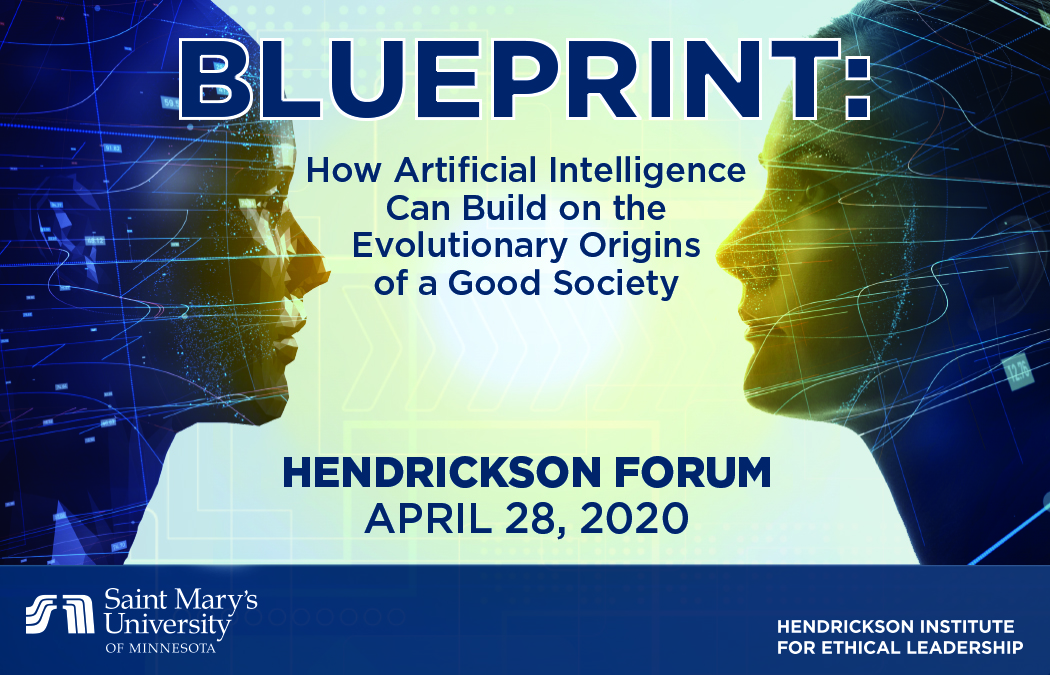
Nicholas Christakis to keynote Saint Mary’s Hendrickson Forum April 28 in Minneapolis
Saint Mary’s University of Minnesota announced today that its 2020 Hendrickson Forum keynote speaker, Nicholas A. Christakis, M.D., Ph.D., M.P.H., director of Yale University’s Human Nature Lab and co-director of the Yale Institute for Network Science, will address how certain kinds of social artificial intelligence (AI) might best be used to enhance our society.
The Tuesday, April 28, event, “Blueprint: How Artificial Intelligence Can Build on the Evolutionary Origins of a Good Society,” is presented by Saint Mary’s Hendrickson Institute for Ethical Leadership.
“At the Hendrickson Institute, we strive to empower leaders with tools to become creative, ethical, and globally oriented,” said Brother Robert Smith, FSC, Ph.D., vice president of Special Initiatives and special advisor to the President, who leads the Hendrickson Forum. “With his far-reaching and ground-breaking work in the areas of social networks and biosocial science, Dr. Christakis is well-positioned to share first-hand insights on how humans evolve in response to technology.”
Drawing on extensive research about the evolutionary origins of a good society, and based on his recent New York Times bestselling book, Blueprint: The Evolutionary Origins of a Good Society, Dr. Christakis will present some new work from his Human Nature Lab regarding the interactions between humans and AI and what the disruptive introduction of AI in our lives could mean for the future of human social behavior. Dr. Christakis will take audiences on a journey from the ancient origins of human society to the forefront of innovation.
About Dr. Christakis
 Named to TIME’s “100 Most Influential People in the World” and to Foreign Policy’s “Top 100 Global Thinkers,” renowned physician and social scientist Nicholas A. Christakis, M.D., Ph.D., M.P.H., helps us more deeply — and optimistically — understand our society as well as our individual and collective behavior.
Named to TIME’s “100 Most Influential People in the World” and to Foreign Policy’s “Top 100 Global Thinkers,” renowned physician and social scientist Nicholas A. Christakis, M.D., Ph.D., M.P.H., helps us more deeply — and optimistically — understand our society as well as our individual and collective behavior.
His current research is primarily focused on two topics: the social, mathematical, and biological rules governing how social networks form (“connection”), and the social and biological implications of how they operate to influence thoughts, feelings, and behaviors (“contagion”). His lab uses both observational and experimental methods to study these phenomena, exploiting techniques from sociology, computer science, biosocial science, demography, statistics, behavior genetics, evolutionary biology, epidemiology, and other fields.
The author of several books and more than 200 articles, Dr. Christakis was elected to the Institute of Medicine of the National Academy of Sciences in 2006 and was made a Fellow of the American Association for the Advancement of Science in 2010.
The Hendrickson Forum
Once a year, during the Hendrickson Forum, Saint Mary’s brings an internationally recognized speaker to its Twin Cities Campus to engage Saint Mary’s faculty, staff, and students, and the wider community in timely and important conversations.
This year’s event will be held Tuesday, April 28, from 11:30 a.m. to 1:15 p.m., with check-in and networking beginning at 11 a.m. at the Saint Mary’s University Center at 2540 Park Ave. in Minneapolis. The event is open to the public and general admission tickets are $50 per person, which includes lunch. Advance registration is required. More information and online registration is available at smumn.edu/hendricksonforum.
The program also includes a presentation of the Hendrickson Medal for Ethical Leadership. The recipient of that award, given by the Hendrickson Institute for Ethical Leadership, will be announced at a later date.
Dr. Christakis will join a distinguished roster of former speakers: the late Cokie Roberts, Zanny Minton-Beddoes, Jon Huntsman, Jr., James Stavridis, Sheila Bair, Ian Bremmer, John Micklethwait, and more. Focusing on issues ranging from global migration to microfinance, world-altering events to the new world order, the Hendrickson Forum is a venue for thought-provoking information and discussion.
About the Hendrickson Institute for Ethical Leadership
The Hendrickson Institute for Ethical Leadership is an educational enterprise of Saint Mary’s University of Minnesota and serves as an educational and transformational resource to the community. Founded in 1994 and located in Minneapolis on the Twin Cities Campus of Saint Mary’s University, the institute serves both current and emerging leaders. It is an academic resource for the university and the wider community, and a forum for exploration of ethical issues. As part of its mission, the institute provides programs that encourage and develop ethical, globally oriented leaders, offers integrative leadership models, promotes practical ethical principles, and infuses leaders with an appreciation of spirituality and free enterprise. For additional information, visit smumn.edu/HendricksonInstitute.
Unprecedented levels of partisanship vitriol threatens the health of democracy in U.S., globally
Voter-based political parties have played an integral role in American politics since their formation in the 1790s, yet it is difficult to remember any other time in history — other than perhaps the 1850s — when the level of divisiveness was this high and the polarity this profound between Republicans and Democrats.
To add more fuel to the fire, the anti-democratic actions against the rule of law by President Donald Trump have become a primary threat to democracy in the U.S., said David Lynch, Ph.D., a professor of History and Social Sciences and Political Science program coordinator at Saint Mary’s University of Minnesota.
The same action are also threatening how the government works and delegitimizing and undermining institutions that make and enforce laws,Lynch added. Those institutions include formal ones such as Congress and the political parties themselves, as well as less formal entities, such as the traditional news media.
“You have to have free, fair, open media in order to have a democracy. If you do not have a free press, you do not have a democracy,” Dr. Lynch said. “And similarly, you need to have the rule of law where laws are carried out not for political ends, but based on the laws.”
The recent impeachment proceedings were an attempt to curtail these actions, but the partisan response to the Senate’s impeachment trial allowed the violation of democratic norms to be rewarded, said Dr. Lynch.
Furthermore, politicians who react strongly to anti-democratic actions threaten to further delegitimize the government, such as Trump’s refusal to shake the hand of House Speaker Nancy Pelosi, a Democrat, at his most recent State of the Union address and her subsequent action of tearing up his speech.
“That helps both sides reinforce their own position that the other side is less legitimate and that we shouldn’t cooperate with somebody like that,” Dr. Lynch said.
Dr. Lynch pointed to how the indices that measure the health of democracy both in the U.S. and abroad have all gone down since Trump won the 2016 election. In addition, the most recent Economist Intelligence Unit’s Democracy Index reflected the worst registered global democracy score since its inception in 2006. In that report, the U.S. received a score of “flawed democracy.”
Traditionally, the U.S. democratic system has been able to regulate such extreme partisanship before election day by not nominating candidates that violate democratic norms or are far from the ideological center. On election day, overly partisan candidates are vulnerable in swing districts and swing states. That ability for the public to express its collective voice, though, has eroded over the years as the number of swing districts has dwindled.
“When people view through a partisan lens, it changes the incentives that elected officials have because they may be rewarded for partisan but anti-democratic actions,” Dr. Lynch said. “It also changes how average people view this whole debate.”
To demonstrate the current political scene in the U.S., Dr. Lynch alluded to a 2017 study conducted by a group of political scientists at Yale University in which experimental surveys were sent to Venezuelans to see to what degree they would be willing to accept a less democratic candidate if he or she was a member of the political party they affiliated themselves with. The answer was quite a large degree.
“The big message here is you can’t necessarily rely on the public just to vote out an anti-democratic candidate because they might get a partisan advantage from that anti-democrat,” Dr. Lynch said.
Are you a journalist covering this topic and interested in an interview? That’s where we can help.
David Lynch, Ph.D., professor of History and Social Sciences and Political Science program coordinator, has taught political science at Saint Mary’s University of Minnesota since 1996. Dr. Lynch has also written over a dozen chapters on international relations, international political economy, and American foreign policy, including the chapter on trade in the United Nations Association of the USA’s “A Global Agenda” from 1996 to 2005.
Dr. Lynch is an expert in political science, political economies, and international relations. He is available to speak with the media. To arrange an interview with him, simply click on his photo below to access his contact information.
David Lynch, Ph.D.
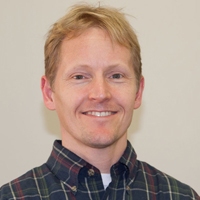 Professor, Department of History and Social Sciences
Professor, Department of History and Social Sciences
Program Coordinator, Political Science
Expertise: International relations and political economies, particularly trade, globalization, and regional trade agreements
View profile
Entrepreneurship expert: New Americans vital to U.S. economy
In the United States, there is a long history of marginalized communities being extremely entrepreneurial. These communities were driven, in large part, by the desire to meet their own ethnic, religious, and cultural needs, according to Christine Beech, D.M., the Dr. Jon and Betty Kabara Endowed Chair in Entrepreneurship and Innovation at Saint Mary’s University of Minnesota.
In the mid-19th century, more than 100 hospitals were founded by the Jewish community to fight anti-Semitism in medical school appointments and meet patient needs of having kosher options during the hospital stay.These opportunities were not available in the existing network of mainstream hospitals.
Similarly, in the beginning of the 20th century, Irish Catholic immigrants began establishing a network of parochial elementary schools as a way to preserve their faith and culture and allow children to learn about their faith in school, Dr. Beech said. These two initiatives, led by immigrant groups, helped establish networks of schools and healthcare institutions that served a social good in their communities while generating jobs and stimulating the economy.
In addition, there is a long line of entrepreneurs in the African-American community who combatted racial discrimination through new businesses because they were marginalized from the mainstream economy, Dr. Beech said. Examples of these entrepreneurs include Madam C.J. Walker, who invented a line of hair care products to serve the needs of her community, and Charles Clinton Spaulding, who developed the largest African-American business in the early 20th century specifically serving the insurance needs of the African-American community.
In modern times, one of the largest marginalized communities in the U.S. is comprised of new Americans, many of whom are immigrants and have developed culturally responsive businesses.
Although current policies are set in place to curtail U.S. immigrants, it is important to remember that the country could potentially lose an entire segment of the population that has been vital to the economy, Dr. Beech said.
Beech pointed to a 2015 study from the Kauffman Foundation which mentioned that 40% of the Fortune 500 in 2010 were companies founded by an immigrant or the child of an immigrant. Nearly 30% of all new businesses started in 2014 were started by immigrants, Dr. Beech said, according to a related study from the same foundation.
“We’ve been able to see constant growth and diversity within our economy that’s been very healthy for us,” said Dr. Beech, who also serves as the executive director of the Kabara Institute for Entrepreneurial Studies at Saint Mary’s. “There’s a narrative that says that the immigrant community is coming here to find work. But in fact, when we look at the data, a significant portion of them are actually creating jobs and starting businesses.”
Dr. Beech added three primary reasons for these continued statistics indicating significant immigrant entrepreneurship:
- The drive to be independent
- A desire to meet their communities culturally specific needs
- A response to societal biases that hinder success within the mainstream workforce
“Those migrant communities often develop their own businesses, almost like a subset of the economy, where they can’t be marginalized, where they’re actually taking charge of their own economic well-being,” said Dr. Beech.
When it comes to knowing the overall impact of the immigration policies on the economy, there will be a natural lag in the data — possibly as long as five years — given how much time it typically takes for immigrants to establish businesses after arriving in a new country, Dr. Beech said.
Are you a journalist covering this topic and interested in an interview? That’s where we can help.
Christine Beech, D.M., has had a career that encompasses academics, entrepreneurship, military service, and consulting. She has been a faculty member in the business department at Saint Mary’s University since 2017 and is the executive director of the Kabara Institute for Entrepreneurial Studies. Before joining Saint Mary’s University, Dr. Beech owned her own consulting business in the Washington, D.C., area for many years. Before that, she worked as a corporate entrepreneur where she led the development of a multimillion-dollar business line for a global consulting firm.
Dr. Beech is an expert in entrepreneurship, social entrepreneurship, and women entrepreneurs. She is available to speak with the media. To arrange an interview with her, simply click on her photo below to access her contact information.
Christine Beech, D.M.
 Executive Director, Kabara Institute for Entrepreneurial Studies
Executive Director, Kabara Institute for Entrepreneurial Studies
Dr. Jon and Betty Kabara Endowed Chair in Entrepreneurship and Innovation
Assistant Professor of Business
Expertise: Entrepreneurship, Hybrid Organizations, Succession Planning, Social Entrepreneurship, Women Entrepreneurs, Veteran Entrepreneurs
View profile
Saint Mary’s Chamber Singers to perform in Colorado
WINONA, Minn. — The Chamber Singers of Saint Mary’s University of Minnesota will perform in Denver and Colorado Springs, Colo., as part of their 2020 concert tour.
The 24-voice select ensemble is directed by Dr. Patrick M. O’Shea, professor of music.
Tour performances will include the following liturgies and concerts:
• Co-Cathedral of St. John the Evangelist, Rochester, Minn.
Saturday, Feb. 29, 4:30 p.m. Mass
• Grace & St. Stephen’s Episcopal Church, Colorado Springs, Colo.
Wednesday, March 4, 7:30 p.m. Concert
• Mullen High School, Denver, Colo.
Thursday, March 5, 10:15 a.m. Short Concert (for students and staff)
• Holy Name Catholic Church, Sheridan, Colo.
Friday, March 6, 7 p.m. Concert
• Cathedral Basilica of the Immaculate Conception, Denver, Colo.
Saturday, March 7, 4:30 p.m. Mass
All concerts are free and open to the public unless otherwise indicated above, and guests are welcome at the various liturgies. Repertoire will include a cappella works by William Byrd, Giovanni da Palestrina, Stephen Paulus, Abbie Betinis, Tomás Luis de Victoria, and Moses Hogan. The concerts will feature the Colorado premiere performances of “Haill, Quene of Hevin,” a setting of a modernized Middle English text by Dr. O’Shea.
Upon their return, the Chamber Singers will present a free “Homecoming Concert” at the Chapel of Saint Mary of the Angels, 7th and Vila streets, Winona, on Thursday, March 12, at 7:30 p.m.
For more information, call 507-457-1598 or fax 507-457-1611.
Award-winning cook, speaker to dish up Cardinal Virtue presentation March 11
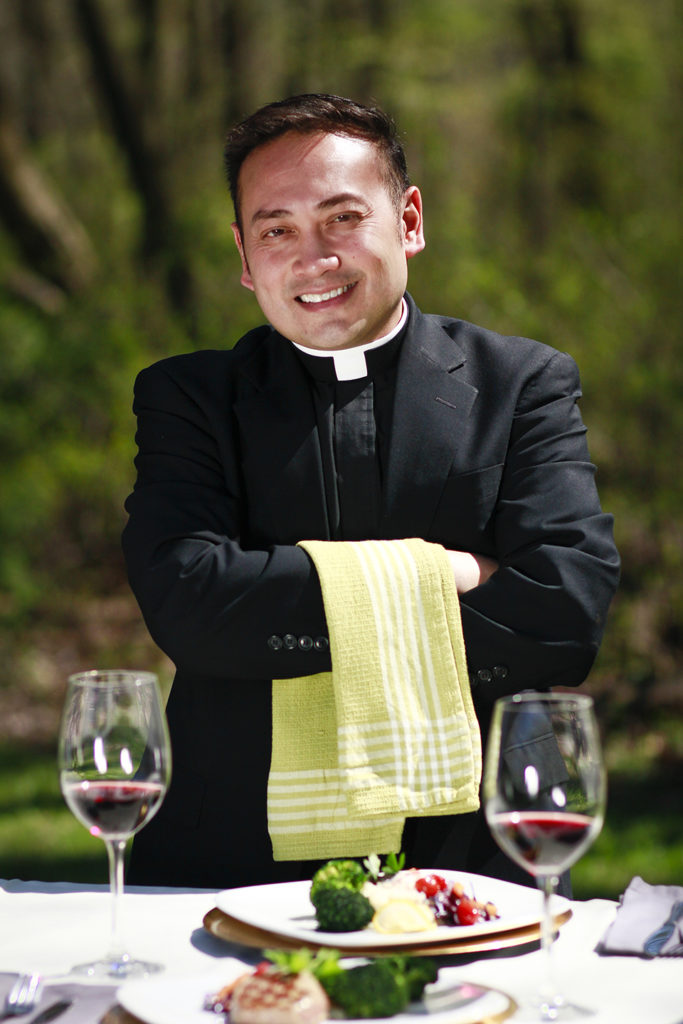 The Rev. Leo E. Patalinghug, IVDei, an award-winning cook and acclaimed speaker, will dish up an interesting discussion about community for the next Cardinal Virtue presentation Wednesday, March 11. The public is invited to watch and listen to the Rev. Patalinghug at 6 p.m. in Saint Mary’s University’s Toner Student Center.
The Rev. Leo E. Patalinghug, IVDei, an award-winning cook and acclaimed speaker, will dish up an interesting discussion about community for the next Cardinal Virtue presentation Wednesday, March 11. The public is invited to watch and listen to the Rev. Patalinghug at 6 p.m. in Saint Mary’s University’s Toner Student Center.
The Rev. Patalinghug hosts a weekly international TV show, Savoring our Faith, on EWTN and is also a bestselling author, radio and podcast host, and internationally acclaimed speaker. His unique background as a two-time black belt martial arts instructor, award-winning break dancer and choreographer, and award-winning cook has caught the attention of many media and entertainment outlets, from ABC, FOX, NBC, PBS, NBC, the Cooking Channel, and also the Food Network where he defeated the world-famous chef in a competition called, “Throw Down with Bobby Flay!”
With an appetite for making deep discussions more bite sizable, the Rev. Patalinghug and his movement, “Plating Grace,” and the nonprofit group, “The Table Foundation,” are helping bring our world together … one plate of grace at a time. He is a priest member of a community of consecrated life, Voluntas Dei (The Will of God) and currently resides in Baltimore, Md.
Cardinal Virtue presentations are thematically centered around the virtues of courage (fortitude), justice, prudence (practical wisdom), and temperance.
Visit smumn.edu/cvrsvp to RSVP. Questions about this or any of the Cardinal Virtues presentations may be directed to Saint Mary’s University’s Office of Mission at 507-457-1646.
The Cardinal Virtues
Courage (Fortitude) moderates those desires that prevent us from undertaking more daunting, difficult tasks — even allowing us to endure pain and discomfort when necessary in pursuit of truth and good.
Justice is a sustained or constant willingness to extend to each person what he or she deserves in relation to what is truly good for that individual and having both community and individual elements related to it.
Prudence (Practical Wisdom) is an intellectual aptitude that enables us to make judgments that are consonant with our proper end as human beings.
Temperance, in a general sense, denotes a kind of moderation common to every moral virtue and is directed to the good.
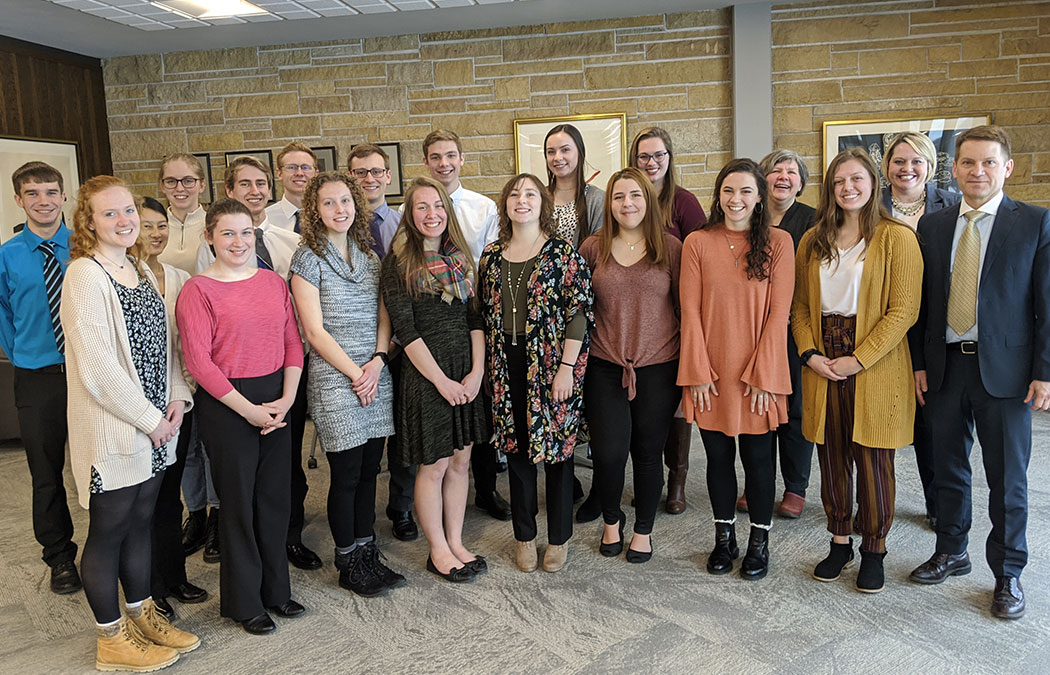
Delta Epsilon Sigma inducts new members
Several individuals were recently inducted into Delta Epsilon Sigma, a national scholastic honor society for students, faculty, and alumni of colleges and universities with a Catholic tradition. It was founded in 1939 to recognize academic accomplishments, to foster scholarly activities, and to encourage a sense of intellectual community among its members. To be eligible for membership in the society, candidates must have a record of outstanding academic accomplishment, have shown dedication to intellectual activity, and have accepted their responsibility of service to others.
New inductees included: (seniors) Zachary Bracken, Anna Dale, Sarah Hardy, Tyler Hyatt, Ryan Krewer, Solomon Liebl; (juniors) Clare Bath, Isabel Bettag, Erin Ciconte, Elizabeth Davis, McKenna Gaalswyk, Katelyn Keller, Julia Kirk, Colleen Lois, Graham Lorsung, Amanda Pohlman, Joseph Pyka, Hallie Schmeling, Kristopher Shepard, Rachel Simon, Clarissa Van Dale, Teresa Wroblewski; and (faculty and administration) Joyce Bautch, Ph.D., Sarah Ferguson, Ph.D., Brian Schmisek, Ph.D., and Michelle Wieser, Ph.D.

Saint Mary’s invites public to Drew Dudley presentation on leadership March 10
WINONA, Minn. — Leadership guru, popular TED talk speaker, and author Drew Dudley will present “The Leadership Test” 7 p.m. Tuesday, March 10, in Saint Mary’s University’s Page Theatre.
In his engaging and empowering keynote, Dudley will demonstrate a form of leadership to which we should all aspire: one that is driven by a daily commitment to acting on six key leadership values:
- Impact
- Courage
- Growth
- Empowerment
- Class
- Self-respect
Dudley provides six questions that comprise “The Leadership Test,” and while the questions may be simple, the behavioral changes they generate build better careers, stronger organizations, and more fulfilling lives.
He has spoken to more than 250,000 people on five continents, been featured on The Huffington Post, Radio America, Forbes.com, and TED.com, where his “TED talk” has been voted “one of the 15 most inspirational TED talks of all time.” TIME, Business Insider and Inc. magazines have all named his talk as one of their “10 speeches that will make you a better leader.”
Dudley is the founder and chief catalyst of Day One Leadership, Inc., which helps organizations around the world increase their leadership capacity. His clients have included some of the world’s most dynamic companies and organizations, including McDonald’s, JP Morgan Chase, and over 75 colleges and universities.
Prior to founding Day One, he spent eight years as the director of one of Canada’s largest leadership development programs at the University of Toronto, and served as national chair of one of Canada’s largest youth charities, which mobilized 35,000 volunteers to raise a million dollars annually to support the work of Cystic Fibrosis Canada.
His first book, This is Day One: A Practical Guide to Leadership That Matters, debuted at No. 6 on The Wall Street Journal Bestseller List, and has gone on to become an international bestseller.
The event, free and open to the public, is sponsored by Saint Mary’s Hendrickson Institute for Ethical Leadership. The Hendrickson Institute — committed to serving both emerging and current leaders of society — is an academic resource for the university and the community, providing forums for the exploration of ethical issues.
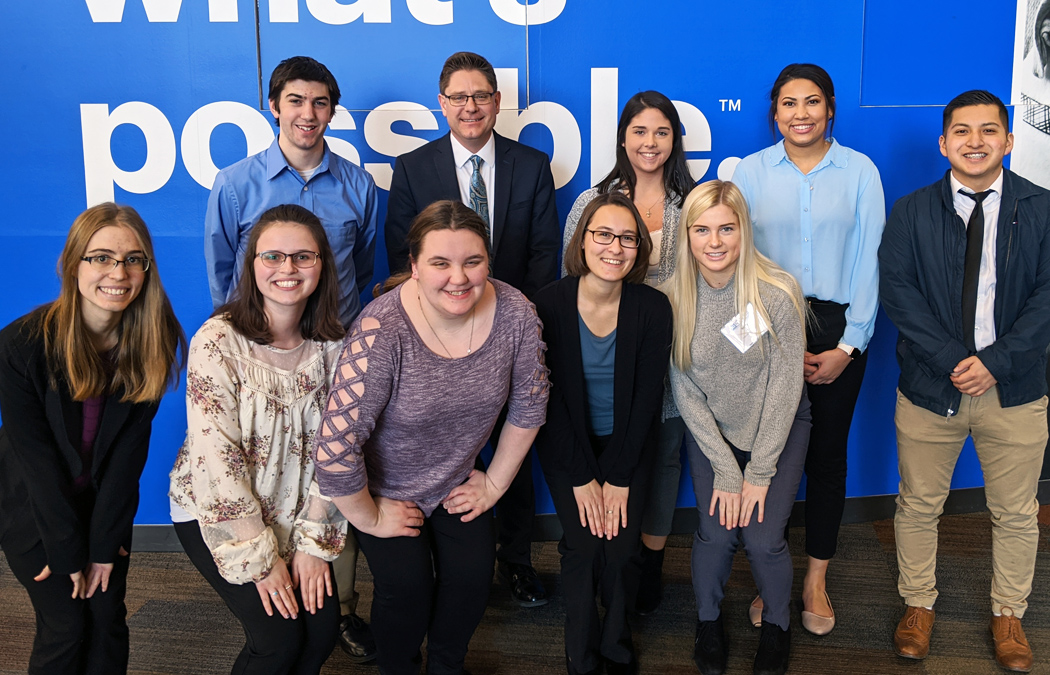
Communication students add real-world experience to their education
When it comes to the communication department at Saint Mary’s University of Minnesota, the goal is to always balance knowledge gained inside the classroom with experience outside of it.
“We’re trying to get students meeting with professionals and getting some real-life skills and experiences that they can take to any job,” said Dean Beckman, department chair and associate professor, Communication.
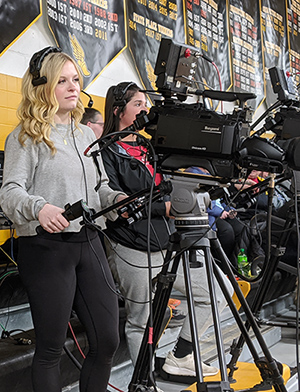
Saint Mary’s students Grace Gilles, left, and Allison Grengs operate the cameras of a high school basketball game for HBC TV-25.
On. Feb. 8, a delegation of 10 students from the Public Relations/Business Club attended PR North, an annual event that is hosted by the Minnesota chapters of the Public Relations Society of America and the International Association of Business Communicators. This year, the event was held at Best Buy’s corporate headquarters in Minneapolis.
The keynote presentation, “How to Build Your Personal Brand,” offered students advice on how to professionally present themselves in job applications and on social media channels. Students also met with professionals at a career fair, had their resumes critiqued, participated in mock interviews, and received professional photos.
Sophomore Maggie Heuer, a public relations major from Chaska, Minn., said that the greatest benefit the event provided was the ability to network with potential employers.
“I was very surprised to see how many of the professionals there are really eager to connect with you,” Heuer said. “And they were sincere about it, too. So it wasn’t just ‘Connect with me on LinkedIn.’ It was ‘Connect with me on LinkedIn, but also stay in contact with me’ or ‘I’d love to hear from you’ or ‘I’ll keep you updated on positions or internships available.’”
“I’ve learned a lot about the behind-the-scenes aspects of what I want to do. That’s a very team-oriented job. It’s all about working together to make the best broadcast or show you can.”
—Grace Gilles, sophomore
In addition, there are currently six students — one of the highest numbers in years — who are working with HBC TV-25 in some capacity, either as interns for college credit or working part time for the station’s coverage of area college and high school sports either as camera operators, instant replay operators, or assistant directors. Some have filled in as play-by-play broadcasters on occasion as well.
Grace Gilles is a sophomore from Apple Valley, Minn., on the volleyball team, majoring in journalism, digital media, and sports management. She hit the ground running as a camera operator right after the volleyball season ended.
“I’ve learned a lot about the behind-the-scenes aspects of what I want to do,” Gilles said. “That’s a very team-oriented job. It’s all about working together to make the best broadcast or show you can.”
Featured image: A group of students from the Public Relations/Business Club attended PR North on Feb. 8 in Minneapolis. The delegation included, from left: (front row) Morgan Prokosch, Hayley Graham, Jillian Alekna, Maggie Heuer, and Mary Loy; (back row) Guy Cardinal, Dean Beckman (faculty adviser), Allison Grengs, and Brooklyn Singleton. Not pictured: Kelly Ferguson
